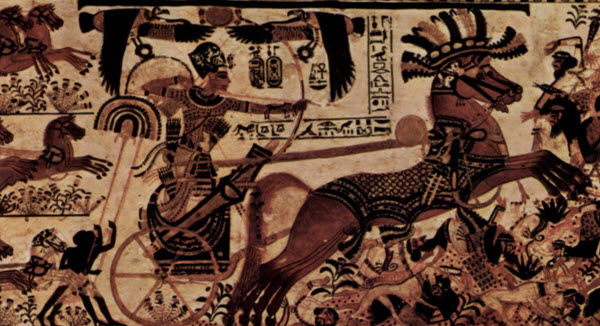About…
Horses in the Bible
Hebrew: סוּס —transliteration: cuwc
In the Scripture, horses are always referred to in connection with war or warlike operations, except in Isaiah 28:28 where horses are mentioned in relation to threshing grain for bread.

The war horse is vividly described by God in Job 39:19-25, where God humbles Job by describing numerous wondrous creatures He has made, including man’s often brave companion, the horse.
God: “Do you give the horse his might?
Do you clothe his neck with a mane?
Do you make him leap like the locust?
His majestic snorting is terrible.He paws in the valley, and rejoices in his strength;
He goes out to meet the weapons.He laughs at fear and is not dismayed;
And he does not turn back from the sword.The quiver rattles against him,
The flashing spear and javelin.
With shaking and rage he races over the ground,
And he does not stand still at the voice of the trumpet.
As often as the trumpet sounds he says, ‘Aha!’
And he scents the battle from afar,
And the thunder of the captains and the war cry.” —Job 39:19-25 NASB

After their settlement in Canaan, God prohibited future leaders or kings of the Israelites from building war horse armies…
“Moreover, he shall not multiply horses for himself, nor shall he cause the people to return to Egypt to multiply horses, since the Lord has said to you, ‘You shall never again return that way.’” —Deuteronomy 17:16 NASB
King Saul apparently obeyed this prohibition, but David partially disobeyed it—forming a 100 chariot cavalry force using war horses captured from the Ammonite King Hadadezer.
“David defeated Hadadezer, the son of Rehob king of Zobah, as he went to restore his rule at the River [Euphrates].
David captured from him 1,700 horsemen and 20,000 foot soldiers; and David hamstrung the chariot horses, but reserved enough of them for 100 chariots.” —2 Samuel 8:3-4 NASB
David would likely require 100-200 or more horses for those chariots (1 to 2 horses per chariot, and perhaps some reserve horses to deal with fatigue and injury). The rest of the war horses he could have killed or perhaps sold. Rather, he took them out of play by crippling them, thus sparing their lives and making them permanently useless for battle, both to the Israelites and their enemies.
King Solomon proceeded much more boldly against God’s prohibition against collecting war horses. Using his skillful connections with Egypt, Solomon greatly multiplied his number of horses (1 Kings 4:26; 10:26, 29) and built great stables. Solomon clearly broke God’s command in every way.
After this, horses were freely used in Israel (1 Kings 22:4; 2 Kings 3:7; 9:21, 33; 11:16).
Horse tack
Horse tack mentioned in Israel includes the bridle (Isaiah 30:28) and a curb (Psalm 32:9).
More information
- horseman
- war
- bridle
- bit
- chariot
- army
- bell
- horse gate
- hough
- barley
- hoof
- color and horses
- the term “yarn” and horses
- the term “bay” and horses
- hornets and horses
- day’s journey
- flint
- greyhound
- horse-leech
- Evolutionism—Did horses evolve from a small fox-like animal? Answer
- Evolutionism—Many textbooks teach that the horse has evolved from only 61 centimeters to its present state of over 2 meters over a 60 million year period. But learn what inconsistencies the textbooks don't teach about the horse’s evolution. GO…
- animals in the Bible